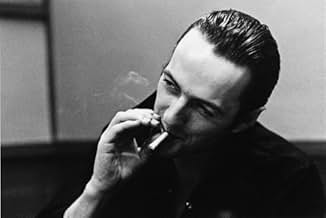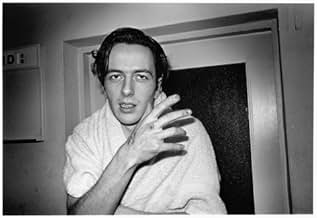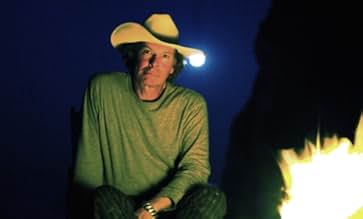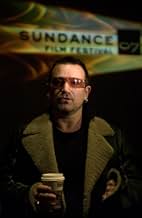CALIFICACIÓN DE IMDb
7.5/10
4.3 k
TU CALIFICACIÓN
Martin Scorsese, Bono, Jim Jarmusch, Flea y otras personas recuerdan la vida de Joe Strummer, cantante y guitarrista de la banda Clash.Martin Scorsese, Bono, Jim Jarmusch, Flea y otras personas recuerdan la vida de Joe Strummer, cantante y guitarrista de la banda Clash.Martin Scorsese, Bono, Jim Jarmusch, Flea y otras personas recuerdan la vida de Joe Strummer, cantante y guitarrista de la banda Clash.
- Premios
- 1 premio ganado y 4 nominaciones en total
Joe Strummer
- Self
- (material de archivo)
The 101ers
- Themselves
- (material de archivo)
Brigitte Bardot
- Self
- (material de archivo)
Mark 'Bez' Berry
- Self
- (as Bez)
Big Audio Dynamite
- Themselves
- (material de archivo)
The Clash
- Themselves
- (material de archivo)
Peter Cushing
- Winston Smith
- (material de archivo)
Opiniones destacadas
I absolutely love The Clash and, because I liked Temple's film about the Sex Pistols, I had high hopes for this. Like many other people, I found the campfire interviews completely unsatisfying, especially since none of the subjects are identified at all. We hear very little from Mick Jones and not all from Paul Simonon. On the other hand, we are treated to John Cusack and a pirate-costumed Johnny Depp. Matt Dillon shares a fascinating anecdote in which he recounts something a taxi driver once told him about Joe Strummer, and Anthony Kiedis tells us that Joe hired someone who used to drum for him. Gosh! If any of these people knew Joe in a meaningful way, they don't make that clear on screen. Why Bono and not Billy Bragg talking about Joe's political effect on his own music? Perhaps Julien Temple is hopelessly starstruck. The film's only redeeming features were the home movies, photographs, live performances and excerpts from Joe's BBC radio show.
This film is not worthy of the man who inspired it. I will keep my fingers crossed that another filmmaker, one who favours substance over style, will some day make the definitive Joe Strummer documentary.
This film is not worthy of the man who inspired it. I will keep my fingers crossed that another filmmaker, one who favours substance over style, will some day make the definitive Joe Strummer documentary.
The majority of the talking heads that are used to frame this film have been captured outdoors next to a bonfire, brazier or something similar there is a reason for it and it is something that you should bear in mind when considering watching this film. The device is a good one and what it does is take sound-bites that could have just felt a bit like scripted puff and turns them into reminiscing round a fire with friends. This fits with the "bigger" comments from band members etc, who do feel like they are sitting reminiscing about the old days but with this comes a problem. You see, the entire film has embraced this approach the approach that we are among friends, people who were all there, know all the stories and love telling them and hearing them even if they have heard them many times before. Not that there is anything wrong with this as an idea because it does offer the potential for an engagingly personal film that perhaps risks inaccuracy via recollection but gets a lot of passion and such in its place.
Unfortunately when taken to an extreme this does risk alienating the casual viewer who is too young to remember and is using the film to fill in them on what they have missed. With this audience sector (which I am in) Julian Temple seems disinterested, even to the point where he doesn't put any captions on the talking heads to tell us who they are. This is irritating because it is hard to shake the feeling that you are looked down on by Temple and perhaps a bit unwelcome as a viewer and it is not a feeling that I ever shook. However, having said that, the personal reflections and observations do help counter this because they do make for an engaging film in terms of feeling if not information. The majority of the footage is "home" video and newsreel footage from the times in question and this is mostly edited together really well to inform and shore up the contributions and feel.
It is not totally successful though even if it was a big improvement on Temple's film on Glastonbury. It doesn't inform a lot and it is so personal that it is hard to always stay with it whenever you do feel like you are being excluded if you're not in the in-crowd. Ironically though, while he seeks this feel at the expense of names on the contributors, he is fine with having famous faces with almost nothing to say in there OK it at least gave me people I could instantly put a name to but otherwise I'm not sure what Cusack, Bono, Depp and others added that anyone with The Clash greatest hits CD on their shelf. Not sure why he bothered to put footage of no relevance in either (such as Animal Farm clips) as it just cluttered it and made it feel like he was trying to be creative by doing what any arty film student would with montages of stock footage.
The Future is Unwritten is an engaging but flawed film that will mostly appeal to those that "were there, man" rather than the casual viewer. The passion and personal feel to the film at least counters the "if you're name's not down you're not coming in" feel that it all has but never totally and, while Temple does produce an interesting structure and feel, it doesn't work as well as he would like to think. A must for fans and perhaps just about good enough for the casual viewer.
Unfortunately when taken to an extreme this does risk alienating the casual viewer who is too young to remember and is using the film to fill in them on what they have missed. With this audience sector (which I am in) Julian Temple seems disinterested, even to the point where he doesn't put any captions on the talking heads to tell us who they are. This is irritating because it is hard to shake the feeling that you are looked down on by Temple and perhaps a bit unwelcome as a viewer and it is not a feeling that I ever shook. However, having said that, the personal reflections and observations do help counter this because they do make for an engaging film in terms of feeling if not information. The majority of the footage is "home" video and newsreel footage from the times in question and this is mostly edited together really well to inform and shore up the contributions and feel.
It is not totally successful though even if it was a big improvement on Temple's film on Glastonbury. It doesn't inform a lot and it is so personal that it is hard to always stay with it whenever you do feel like you are being excluded if you're not in the in-crowd. Ironically though, while he seeks this feel at the expense of names on the contributors, he is fine with having famous faces with almost nothing to say in there OK it at least gave me people I could instantly put a name to but otherwise I'm not sure what Cusack, Bono, Depp and others added that anyone with The Clash greatest hits CD on their shelf. Not sure why he bothered to put footage of no relevance in either (such as Animal Farm clips) as it just cluttered it and made it feel like he was trying to be creative by doing what any arty film student would with montages of stock footage.
The Future is Unwritten is an engaging but flawed film that will mostly appeal to those that "were there, man" rather than the casual viewer. The passion and personal feel to the film at least counters the "if you're name's not down you're not coming in" feel that it all has but never totally and, while Temple does produce an interesting structure and feel, it doesn't work as well as he would like to think. A must for fans and perhaps just about good enough for the casual viewer.
I can't say anything of this movie by Julian... My comment is I want to cry.. I was really touched of the movie The Future is Unwritten.. Hoping for the next movie of Julian... ^_^ More Power.
Joe Strummer was born as John Mellor in Ankara, Turkey on August 21, 1952. His father was a British foreign-service diplomat; his mother, a nurse, was a crofters's daughter from the Scottish Highlands. The family spent much time moving from place to place, and Strummer spent his childhood in a variety of countries. At the age of 9, Strummer and his older brother David, 10, began boarding at the City of London Freemen's School in Surrey. Strummer rarely saw his parents during this time. He developed a love of rock music, listening to records by The Beatles and The Beach Boys, as well as American folk-singer Woody Guthrie (Strummer would even go by the name "Woody" for a few years, until changing his name to "Joe Strummer" a year and a half before the Clash was formed). Strummer was never very close to his brother David, but nonetheless David's suicide significantly changed Joe's outlook on life. After finishing his time in boarding school in 1970 Strummer moved on to London's Central School of Art & Design, where he briefly flirted with the idea of becoming a professional cartoonist. During this time, Strummer shared a flat in the north London suburb of Palmers Green with friends Clive Timperley and Tymon Dogg.
For those who didn't know who is Joe Strummer and for those who haven't seen the movie yet...
Joe Strummer was born as John Mellor in Ankara, Turkey on August 21, 1952. His father was a British foreign-service diplomat; his mother, a nurse, was a crofters's daughter from the Scottish Highlands. The family spent much time moving from place to place, and Strummer spent his childhood in a variety of countries. At the age of 9, Strummer and his older brother David, 10, began boarding at the City of London Freemen's School in Surrey. Strummer rarely saw his parents during this time. He developed a love of rock music, listening to records by The Beatles and The Beach Boys, as well as American folk-singer Woody Guthrie (Strummer would even go by the name "Woody" for a few years, until changing his name to "Joe Strummer" a year and a half before the Clash was formed). Strummer was never very close to his brother David, but nonetheless David's suicide significantly changed Joe's outlook on life. After finishing his time in boarding school in 1970 Strummer moved on to London's Central School of Art & Design, where he briefly flirted with the idea of becoming a professional cartoonist. During this time, Strummer shared a flat in the north London suburb of Palmers Green with friends Clive Timperley and Tymon Dogg.
For those who didn't know who is Joe Strummer and for those who haven't seen the movie yet...
On December 22, 2002, at the ripe young age of 50, John Graham Mellor - better known as Joe Strummer, co-founder, lyricist, rhythm guitarist and lead singer for the group The Clash - died, rather prosaically, of a heart attack. I say "prosaically" because one would reasonably have envisioned a somewhat more "exotic" and "respectable" end for a punk rock artist of Joe Strummer's caliber. Yet, perhaps it's not quite so strange after all, for like many of his musical contemporaries, Strummer lived his life in the fast lane, perhaps burning so intensely for such a brief period of time that his battered and overstretched heart simply couldn't keep up with all the demands placed on it after awhile (actually, we're told he suffered from a congenital heart condition of which he had no knowledge and which could have taken his life at any time).
Whatever the cause of his demise, the documentary "Joe Strummer: The Future is Unwritten" provides a compelling and really quite exhaustive look into the life and career of this punk music legend. The movie starts at the beginning with Mellor's birth in Ankara, Turkey, to a father who was a British diplomat and a mother who was a nurse. He had a generally unhappy childhood, being whisked from one country to another before eventually being deposited in a British boarding school, seeing very little of his parents during the seven year period in which they were living abroad.
The movie then goes on to chronicle the death of his older brother by suicide; Mellor's enrollment in art college (where he changed his name to Woody and formed his first band, The Vultures); his time living as a squator in some abandoned row houses in West London with a group of fellow musicians with whom he formed his second band, the 101's; and his eventual turning away from Rockabilly and towards punk when The Sex Pistols opened for his group one night and forever altered Mellor's view of what music could be and do. By this time he had already changed his name a second time - now he was to be known as Joe Strummer - and had become extremely adept at writing lyrics and playing rhythm guitar.
It was at this point in 1976 that he essentially abandoned his former friends and hooked up with Mick Jones, Paul Simonon and Nicky Headon to form the band The Clash. The film then records the rise of that group, emphasizing the driving energy and social commentary of its music, as Strummer, through his lyrics, boldly took on the political and military establishment, decrying civil injustice and examining the very nature of authority itself. In fact, the movie makes it clear that the punk movement itself represented a revolt not just against society as a whole but against previous styles of music and fashion - and even one's old friends and way of life, including, in Strummer's case, his pre-Clash band mates, many of whom agreed to be interviewed for this film.
In the latter stages, the movie explores the paradox of success and celebrity, especially for performers who base their art on railing against the very things they find themselves endorsing in the end: namely, conformity, commercialism, fame and self-indulgence. For The Clash this was exemplified by the "sellouts" of going to America, of achieving international acclaim with their 1979 album "London Calling," and of writing "hit" songs (most notably, of course, "Rock the Casbah"). This accelerating artistic ambiguity led to increased personal tension among the members of the band and the eventual dissolution of the group. Towards the end of his life, Joe turned to marriage and fatherhood and a career in the film industry both as an actor and a composer. But any attempt to revive his career as a singer, at least at first, ended in failure - some would suggest a failure largely calculated and imposed by the man himself. Yet, in his final years, a much more tranquil and mellow Joe began to emerge, managing to make "peace" between the hippies and the punkers by establishing outdoor music fests - affectionately labeled "Joe's Campfires" - to help bridge the gap. And, as an appropriate finale to his life, he embarked on a well-received tour with his last band, The Mescaleros.
Director Julien Temple has put together a surprisingly dense and visually imaginative film, one that is heavily reflective of the turbulent times in which it is set. In addition to interviews with former lovers and friends of Strummer, the movie provides generous helpings of file footage and home movies, as well as clips from films like "If ," "Animal Farm," "1984," etc. whose subject matters parallel elements of Joe's life and the era in which he lived. Temple also frequently interjects into the narrative animated versions of cartoons Joe himself drew over the years. Moreover, a number of familiar faces - Bono, Matt Dillon, Steve Buscemi, John Cusack, Jim Jarmusch, Courtney Love (who appeared with Strummer in the movie "Straight to Hell"), even Johnny Depp in full Jack Sparrow regalia - stop by to throw their two-cents-worth in as to how profoundly they were influenced by Joe and the music of the Clash. And, of course, above it all there is the music
But the true coup here is getting Joe himself to comment posthumously on his own life, thanks to the ready availability of interviews he gave at crucial moments during his career. This allows us to hear the man relate his own story in his own words. It may be a story that ends sadly, but not before Joe seems to find some genuine peace in his life. And, seriously, how many documentaries about a rock star can one say THAT about?
Whatever the cause of his demise, the documentary "Joe Strummer: The Future is Unwritten" provides a compelling and really quite exhaustive look into the life and career of this punk music legend. The movie starts at the beginning with Mellor's birth in Ankara, Turkey, to a father who was a British diplomat and a mother who was a nurse. He had a generally unhappy childhood, being whisked from one country to another before eventually being deposited in a British boarding school, seeing very little of his parents during the seven year period in which they were living abroad.
The movie then goes on to chronicle the death of his older brother by suicide; Mellor's enrollment in art college (where he changed his name to Woody and formed his first band, The Vultures); his time living as a squator in some abandoned row houses in West London with a group of fellow musicians with whom he formed his second band, the 101's; and his eventual turning away from Rockabilly and towards punk when The Sex Pistols opened for his group one night and forever altered Mellor's view of what music could be and do. By this time he had already changed his name a second time - now he was to be known as Joe Strummer - and had become extremely adept at writing lyrics and playing rhythm guitar.
It was at this point in 1976 that he essentially abandoned his former friends and hooked up with Mick Jones, Paul Simonon and Nicky Headon to form the band The Clash. The film then records the rise of that group, emphasizing the driving energy and social commentary of its music, as Strummer, through his lyrics, boldly took on the political and military establishment, decrying civil injustice and examining the very nature of authority itself. In fact, the movie makes it clear that the punk movement itself represented a revolt not just against society as a whole but against previous styles of music and fashion - and even one's old friends and way of life, including, in Strummer's case, his pre-Clash band mates, many of whom agreed to be interviewed for this film.
In the latter stages, the movie explores the paradox of success and celebrity, especially for performers who base their art on railing against the very things they find themselves endorsing in the end: namely, conformity, commercialism, fame and self-indulgence. For The Clash this was exemplified by the "sellouts" of going to America, of achieving international acclaim with their 1979 album "London Calling," and of writing "hit" songs (most notably, of course, "Rock the Casbah"). This accelerating artistic ambiguity led to increased personal tension among the members of the band and the eventual dissolution of the group. Towards the end of his life, Joe turned to marriage and fatherhood and a career in the film industry both as an actor and a composer. But any attempt to revive his career as a singer, at least at first, ended in failure - some would suggest a failure largely calculated and imposed by the man himself. Yet, in his final years, a much more tranquil and mellow Joe began to emerge, managing to make "peace" between the hippies and the punkers by establishing outdoor music fests - affectionately labeled "Joe's Campfires" - to help bridge the gap. And, as an appropriate finale to his life, he embarked on a well-received tour with his last band, The Mescaleros.
Director Julien Temple has put together a surprisingly dense and visually imaginative film, one that is heavily reflective of the turbulent times in which it is set. In addition to interviews with former lovers and friends of Strummer, the movie provides generous helpings of file footage and home movies, as well as clips from films like "If ," "Animal Farm," "1984," etc. whose subject matters parallel elements of Joe's life and the era in which he lived. Temple also frequently interjects into the narrative animated versions of cartoons Joe himself drew over the years. Moreover, a number of familiar faces - Bono, Matt Dillon, Steve Buscemi, John Cusack, Jim Jarmusch, Courtney Love (who appeared with Strummer in the movie "Straight to Hell"), even Johnny Depp in full Jack Sparrow regalia - stop by to throw their two-cents-worth in as to how profoundly they were influenced by Joe and the music of the Clash. And, of course, above it all there is the music
But the true coup here is getting Joe himself to comment posthumously on his own life, thanks to the ready availability of interviews he gave at crucial moments during his career. This allows us to hear the man relate his own story in his own words. It may be a story that ends sadly, but not before Joe seems to find some genuine peace in his life. And, seriously, how many documentaries about a rock star can one say THAT about?
Julian Temple -- who filmed the Clash at one of their earliest rehearsals -- has assembled a truly impressive array of footage, including 8mm family films from Joe's childhood and a performance from the 101ers, his pre-Clash R&B/pub-rock band. There are interviews with Joe's squat-mates from the early 70s, Mick Jones and Topper Headon of the Clash, and numerous other people (musicians and other) who either worked with Joe or were influenced by him. My only reservation is that the movie might be overwhelming to someone who was unfamiliar with Strummer's work, or the broad outlines of his history, but I think even a complete novice would have to come away impressed by the sheer scope of Joe's legacy, both in terms of music and the influence he left on his friends and admirers.
¿Sabías que…?
- ConexionesFeatured in 'Joe Strummer': The Importance of Fire (2007)
Selecciones populares
Inicia sesión para calificar y agrega a la lista de videos para obtener recomendaciones personalizadas
- How long is Joe Strummer: The Future Is Unwritten?Con tecnología de Alexa
Detalles
- Fecha de lanzamiento
- Países de origen
- Sitios oficiales
- Idioma
- También se conoce como
- Joe Strummer: The Future Is Unwritten
- Productoras
- Ver más créditos de la compañía en IMDbPro
Taquilla
- Total en EE. UU. y Canadá
- USD 248,362
- Fin de semana de estreno en EE. UU. y Canadá
- USD 20,880
- 4 nov 2007
- Total a nivel mundial
- USD 1,193,491
- Tiempo de ejecución2 horas 4 minutos
- Color
- Mezcla de sonido
Contribuir a esta página
Sugiere una edición o agrega el contenido que falta

Principales brechas de datos
By what name was The Future Is Unwritten (2007) officially released in Canada in English?
Responda

































